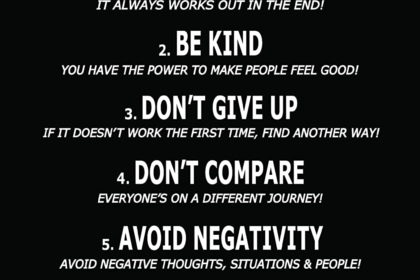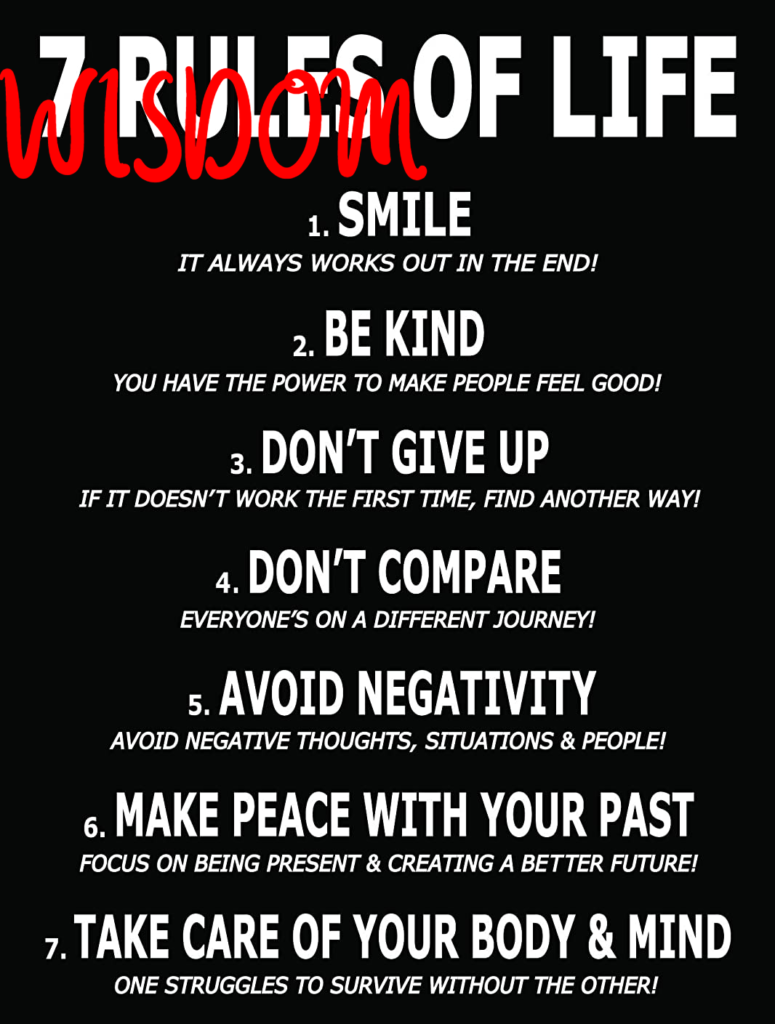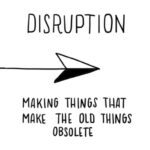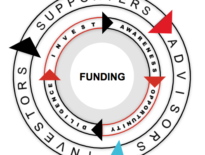
My Dad sent me a thought about Life, and lately, I can’t help but be fixated on notions that life lessons parallel entrepreneurship more than we realize or put into practice.
The notion, for example, of finding cofounders is frequently explored through consideration of Dating and Marriage. Experiences in life informing what it means to be a startup founder. And so, with the warmth of the holidays on our minds, I thought I’d take these life lessons shared from family, and spin them into what they mean in our work with one another.
7 Rules of Life?
You might have seen the image floating around social media, “7 Rules of Life.” After my initial heart-warmed reaction to the list, I revisited that headline and it bothered me a bit. Implying that there are rules, sets the wrong perspective about what the list is suggesting. These perspectives about life aren’t rules, they highlight a different way to appreciate how we might live our live. Are we respectful and caring of other people or not?
You can certainly choose not to prioritize these personality traits, and indeed many people favor being otherwise, or due to mental health challenges, struggles, or former abuses, even simply can’t easily live up to these qualities; but in any event, they aren’t rules and establishing them as rules implies that failing to live up these qualities means that such a person might be justified in their personality and merely breaking the rules. No. Think of these as the highest standard of respect for other people, and if someone chooses or fails to live up the them, they aren’t breaking rules, you’re justified in questioning if you want to associate with them.
Not the Rules of Life, the Wisdom of Life
ONE: Smile. It always works out in the end.
Does it not? Even in the worst of circumstances, the end is a permanent conclusion to it all. Do others want to spend their lives, and their work, with people who can’t appreciate what they have? That they have a life in which to endeavor? Do you want to leave this mortal coil with everyone forgetting you as quickly as they can, or living on in hearts and minds?
Life throws us all a great many hardships. In work, we’re fired, our startups fail, and investments are lost. There is nothing to gain from making others feel like you can’t stand being around them and a smile costs nothing; reassuring others that you are grateful enough to be together.
TWO: Be Kind. You have the power to make people feel good.
You have the power to make people feel awful. Why would you choose that over the alternative.
Early in my startup career, I worked closely with a founder who frequently said, “I abhor that saying, ‘it’s not personal it’s just business, because it’s all personal.'” Every action you take, whether you agree with me or not, is personal. Those work related platitudes of take no prisoners, or selling someone whatever it takes, or of getting a deal done knowing that it isn’t in the best interest of everyone involved, may not be personal to you (because you have that personality), but it is always personal to others.
If you want to succeed in life, in work, be kind, it is personal.
THREE: Don’t Give Up. If it doesn’t work the first time, find another way.
Wow, if ever there was one of the foremost lessons of entrepreneurship drawn from life lessons: Don’t give up, pivot, test and iterate.
Time and time again, studies have uncovered that ventures fail because founders are fixated on the solution they have in mind rather than the problem they hope to solve; thus, when their solution fails, when their idea and vision fall short, they quit. That does not a successful venture make.
Entrepreneurship is a matter of having dozens of ideas, constantly, and trying them, quickly disposing those that fail, and investing more in the ideas that work, along the way to solving a meaningful problem. Don’t give up, find another way.
FOUR: Don’t Compare. Everyone is on a different journey.
Well isn’t that the truth… keeping up with the Joneses, the grass is greener… society is littered with the observation that we all spend too much time worrying about what other people think. And in life, we are each, all, on our unique path and it’s never right to judge someone’s path as you can’t know, you don’t know, all that they’re going through, their values, and their struggles. Just love others.
But I’ll be frank, when I read that life lesson, I had to contemplate a moment how to translate that to entrepreneurship because indeed, as founders, we absolutely need to prioritize market research, competitive analysis, and comparing others! This is how successful founders uncover what NOT to do (how to avoid mistakes) and how we discern what to do.
It dawned on me that the wisdom for work is in reading that point the other way around: Everyone is on a different journey, don’t compare. Even among your competitors, you are taking different approaches for any number of valid reasons – resources available, varied experiences, and different values. Compare them, but appreciate first that we’re on different journeys on purpose – what they do isn’t necessarily what you should do, nor should you feel bad if you’re failing to keep up with their accomplishments.
FIVE: Avoid Negativity. Avoid negative thoughts, situations, and people!
This, a lesson a therapist and advisor once shared, about life more than work…. that the ideal way to handle yourself in abusive situations, is to remove yourself from the situation.
Really negative people are even more obvious and harmful in that they’ll even go on the attack if you try to remove yourself; considering your flight an unwillingness to deal with the situation, considering it uncaring, or even abandonment. But in negative situations, with negative people, you can’t change them; either they treat you with kindness and respect, or you’re stuck in a situation where you’re being poorly treated and possibly blamed for it, through no cause of your own. Things stay the same or it gets worse for you; so remove yourself.
In work? Within the close knit teams that must exist for a group of people to endeavor in the high risk circumstance of a startup? Negativity is destructive and serves to create no value what-so-ever with mistreatment, dissention, and frustration.
Don’t Give Up. If it doesn’t work the first time, find another way. How do we do do that in startup teams and among founders? Not by wasting time and sowing discord by focusing on the failures, being judgmental, or negatively criticizing, but by being positive about new possibilities, new ideas, and the potential still untapped in finding ways to make it work.
SIX: Make Peace With Your Past. Focus on being present & creating a better future.
Is that not the very distinction of a startup?
Does it matter that you failed in that past? That you got fired from that job? That you didn’t graduate high school or that you dropped out of college?
Or are those experiences lessons from which to draw? In a startup, what matters is not what you think or thought, but what you DO and how that positively and effectively impacts the future of what you’re doing. Draw from the past, make peace with it; it is what comprises you, but be present and positive about the future.
SEVEN: Take Care Of Your Mind And Body. One struggles to survive without the other!
I’m an advocate of mental healthcare being one of the natural aspects of any form of healthcare or insurance. I’m also a huge fan of de-stigmatizing mental health in any way what so ever – people are born with mental health challenges, therapy is healthy and not of a sign of a problem nor something to be embarrassed about, and many of society’s worst travesties (homelessness, alcoholism, abuse, and suicide), are directly caused by our all hiding mental health and disregarding care as one of the most important things we can do for one another.
As an entrepreneur? Oof. You will most frequently be told no, won’t work, and bad idea. You will struggle financially. You will lose friends, turn over people, anger competitors and disrupt the status quo (though granted, that anger isn’t really your fault). Many lose family along the way; entrepreneurial people can be difficult to live with – risk averse, rarely financially motivated or oriented, and seemingly aspiring to accomplish something that can’t be done – we’re abnormal.
You will suffer. And you must make time for yourself and your health – you must appreciate and value that others will also suffer, and must make time for their health and themselves.
And in that, some added wisdom is giving the benefit of the doubt, in life in and work. Doing so can be hard, it can be impossible without humility, apology, and the idea that we all should just forgive, but reading these lessons in reverse order, seeing them in a different way, hopefully helps you think about a better way forward for yourself; that that might result in a better world for us all:
- Take care of your mind and body. You’re going to abuse it, you need to make time to care for it.
- Make peace with your past. Those are lessons from which to draw in order to be better; part of you, not defining you. What defines you is what you do now and to better the future.
- Avoid negativity. Hopefully this list read in reverse, this is obvious why. Life is tough enough, and startups even harder, to bother being in such situations.
- Don’t compare. Or rather, everyone is on a different journey. Live yours, not up to theirs. Don’t judge, be better.
- Don’t give up. Really, big picture, there is no alternative; keep at it and figure out a better way forward.
- Be kind. Is that not the only thing that ever matters most? No matter what your life and your challenges, the legacy we leave, how we shape others, and how our companies grow, can value kindness, or not. Given the health issues, financial struggles, and risks involved in what we do, how could you ever bring yourself to be anything but kind to everyone, all the time?
- Smile. Because it’s a simple way to be kind, some positivity to persevere, and a reminder for that mind and body that it could be worse. Besides, you’re going to have a tough row as a founder, seeking customers, partners, investors, and collaborators, if something as simple as a attitude keeps them away.
To you and yours with love for work, and one another…







Wonderful.
The parallels between work life and personal life should be obvious, but aren’t. Appreciate the Friday inspiration!
And to anyone else seeing this comment – take care of yourselves!
Paul O’Brien I really enjoyed reading this. Your Dad sounds like a wise man. Reading these 7 Principles I’m this newsletter reminded me of a couple books I recently read this past year, and they also feel like a palatable summary of the combined 30 principles covered in these 2 books:
-“12 Rules for Life” -by Jordan Peterson
-“Homeless to Billionaire: The 18 Principles of Wealth Attraction and Creating Unlimited Opportunity” -by Andres Pira
When you and your Dad write the book on these 7 principles, I’ll be looking forward to reading my autographed copy. Thanks for the share
I think time should be added to it most valuable thing
What’s the wisdom then? The lesson for others?
Simply that time is the most valuable thing? (agreed.)
Or in this context, I’m thinking it’s something more like…
Respect Time. Yours is precious and your time with others consumes theirs.
Thank you, and wishing you and family Happy Holidays and prosperous 2022!
Great wisdom. Thanks for sharing.
Great article! #2 Being kind is probably one of the most overlooked tools freely available. The business development and friendships that I’ve made from just being nice and handing someone a soda, or holding the door with a smile have been instrumental in my journey in the startup community
Too many people seem ignorant or uncaring of the implication of the alternative.
A kindness is a simple thing to give while a disservice leaves a mark that lingers.
I really liked the # 4. Recently read an article that when there are different types of athletes from runners, to golfers to boxers, they all have different training and we all agree it not comparable. Then why do we compare our life and career with others?
Wonderful analogy for entrepreneurs; some are engineers, others marketers, some sell, and some have resources – all could be doing the same thing, and succeed, but none will do it the same way.
Great article. I found similarities between your article and my role model, 93 years dad. He goes to a gym to keep his muscle, started taking piano lessons recently, in addition to oil paint that he continues for 40+ years. Always being positive, humble, and smiling even in tough situations and kept contributing to the community.
Paul O’Brien your posts are gold. Thank you. Have a wonderful and restful Christmas break.
Great read from Paul O’Brien. Reading it makes it clear that applies to more than startups: career, life, so much.
#career #selfimprovement